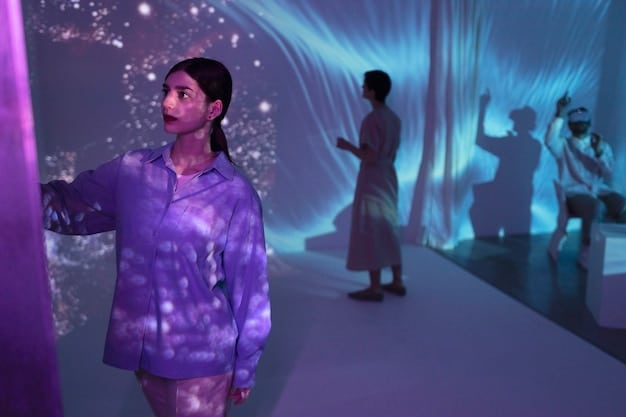Social Media’s Impact on Music Discovery: A Data Analysis

Social media platforms have fundamentally reshaped how music is discovered, consumed, and promoted, driven by data insights into user engagement and algorithmic curation, profoundly influencing artists and the industry alike.
The digital age has ushered in a profound transformation in how we interact with artistic expression, especially music. From curated playlists to viral video challenges, platforms are at the forefront of this revolution. This article delves into The Impact of Social Media on Music Discovery: A Data-Driven Analysis, exploring how these digital ecosystems have not only democratized access but also redefined the pathways artists take to reach global audiences.
The Algorithmic Revolution in Music Curation
The shift from traditional radio airplay to algorithmic recommendations marks a significant turning point in how listeners encounter new music. Today, powerful algorithms on platforms like Spotify, Apple Music, and YouTube analyze user behaviors, preferences, and interactions to suggest tracks and artists a listener might enjoy. This goes beyond simple genre matching, delving into intricate patterns of listening habits.
These algorithms leverage vast datasets, including listening history, skips, repeats, and even the time of day a song is played, to craft highly personalized experiences. This hyper-personalization means that an individual’s musical journey is increasingly unique, tailored precisely to their evolving tastes. It’s a stark contrast to the one-size-fits-all approach of traditional media.
Understanding the Mechanics of Recommendation Engines
Recommendation engines operate on complex machine learning models. Collaborative filtering, for instance, identifies users with similar listening patterns and suggests music enjoyed by those “neighbors.” Content-based filtering, on the other hand, recommends music based on the audio characteristics of songs a user already likes, such as tempo, key, and instrumentation. Hybrid models often combine both approaches for superior accuracy.
- Collaborative Filtering: Matching users with similar tastes to recommend new content.
- Content-Based Filtering: Analyzing music attributes to suggest similar tracks.
- Hybrid Approaches: Combining methods for enhanced personalization and discovery.
The continuous refinement of these algorithms means that the discovery process is dynamic, adapting to new trends and individual shifts in preference. This continuous learning amplifies the potential for serendipitous musical encounters, propelling obscure artists into the limelight and resurrecting forgotten gems.
Moreover, the transparency of some platforms, offering insights into why a particular song was recommended, helps users understand the underlying logic, fostering a deeper trust in the recommendations. This symbiotic relationship between user data and algorithmic output has become the bedrock of modern music discovery.
Social Platforms as Launchpads for Aspiring Artists
Before the advent of widespread social media, breaking into the music industry usually involved significant financial investment or a lucky break with a record label. Today, platforms like TikTok, Instagram, and YouTube have become powerful launchpads, allowing artists to bypass traditional gatekeepers and connect directly with a global audience.
The virality potential of these platforms is unparalleled. A short, catchy snippet of a song shared on TikTok can explode overnight, leading to millions of streams across other services. This phenomenon has created entirely new pathways to fame, demonstrating that raw talent and engaging content can often trump traditional industry connections.

The Power of Viral Content and Challenges
Viral challenges, often involving specific sounds or dance routines, have become a cornerstone of music discovery on TikTok. Artists strategically create content designed for virality, sometimes even shortening their songs to fit the platform’s format, optimizing for maximum shareability.
This strategy allows for a rapid spread of music, as users become active participants in the song’s promotion simply by creating their own content with it. The ripple effect can be massive, turning a relatively unknown artist into a household name in a matter of weeks. The beauty of this model lies in its organic, user-driven nature.
- TikTok Challenges: Driving organic engagement and massive exposure.
- User-Generated Content: Amplifying reach through creative participation.
- Audience Engagement: Building a community around an artist’s sound.
Furthermore, these platforms provide artists with invaluable direct feedback. Comments, likes, and shares offer immediate insights into what resonates with their audience, allowing them to refine their sound and content strategy in real-time. This iterative process of creation and feedback significantly accelerates an artist’s development.
The democratization of tools and reach has leveled the playing field, making it possible for artists from diverse backgrounds and geographies to find their voice and an audience without needing a major label budget. This cultural shift underscores the profound impact social media has had on artistic entrepreneurship.
The Role of Data Beyond Discovery: Marketing and Monetization
While social media excels at music discovery, its utility extends far beyond initial exposure. For artists and music labels, the wealth of data generated on these platforms is a goldmine for targeted marketing, audience understanding, and even innovative monetization strategies. Data analytics provides insights into listener demographics, geographic reach, and engagement patterns, allowing for highly efficient resource allocation.
Understanding which specific elements of a song resonate most with listeners, or where an artist’s fanbase is most concentrated, enables tailored campaigns that maximize impact. This precision marketing replaces the often-inefficient broad-stroke approaches of yesteryear, ensuring every promotional effort is optimized.
Leveraging Analytics for Strategic Growth
Platforms offer artists and their teams detailed dashboards providing analytics on their content. These include metrics like video views, unique listeners, follower growth, engagement rates, and even the sentiment of user comments. This granular data helps in identifying strengths, weaknesses, and untapped opportunities.
For example, seeing a surge in listenership in a particular city can inform touring decisions, while understanding audience age groups can guide merchandise design or collaborations. These insights empower artists to make data-driven decisions about their career trajectory, ensuring sustainable growth.
- Audience Demographics: Informing targeted marketing campaigns.
- Engagement Metrics: Understanding audience interaction with content.
- Geographic Insights: Guiding touring and promotional efforts.
Moreover, the data can reveal unexpected trends or listener behaviors, prompting artists to experiment with new sounds or content formats. This agility, fueled by real-time data, is crucial in the fast-evolving digital music landscape. The ability to adapt quickly based on empirical evidence gives artists a significant competitive edge.
Social media also opens doors for direct monetization through features like tipping, live stream tickets, and brand partnerships driven by audience data. This diverse revenue stream reduces dependency on traditional album sales or streaming royalties, giving artists greater financial independence and creative freedom.
Challenges and Ethical Considerations in the Data-Driven Era
Despite the undeniable benefits, the increased reliance on social media and data for music discovery presents a unique set of challenges and ethical considerations. Concerns around data privacy, algorithmic bias, and the potential for echo chambers are becoming increasingly pertinent as these platforms integrate deeper into our daily lives. The sheer volume of data collected raises questions about user consent and the secure handling of personal information.
Furthermore, the opaque nature of some algorithms can lead to unintended consequences, such as inadvertently promoting certain artists or genres over others, or creating “filter bubbles” that limit users’ exposure to diverse musical tastes. Addressing these issues requires a multi-faceted approach involving platform transparency, regulatory oversight, and user education.
Navigating Algorithmic Bias and Echo Chambers
Algorithmic bias can occur when the data used to train recommendation systems reflects existing societal inequalities or prejudices. This can lead to certain artists or genres being underrepresented, perpetuating a narrow view of the musical landscape. Users might find themselves trapped in echo chambers, primarily exposed to music that confirms their current tastes, thereby stifling exploration.
Platforms are slowly integrating features to mitigate this, such as “discovery” modes that intentionally push users outside their comfort zones. However, the balance between personalization and diversification remains a complex problem, requiring continuous innovation and ethical deliberation.
- Data Privacy: Protecting user information and ensuring transparency.
- Algorithmic Bias: Addressing fair representation and preventing discrimination.
- Echo Chambers: Encouraging diverse music discovery beyond user preferences.
The pressure to constantly produce engaging content for social media can also take a toll on artists, leading to burnout or artistic compromise. The focus shifts from pure musical creation to optimizing for algorithmic discoverability, potentially altering the creative process itself. This raises questions about authenticity and the long-term sustainability of art in a social-media-first world.
Moreover, the immense power wielded by a few dominant platforms raises concerns about market monopolization and fair compensation for artists. Ensuring that artists receive equitable payment and retain control over their intellectual property in this data-driven landscape is an ongoing battle, requiring collective action and advocacy.
The Future Landscape: NFTs, AI, and Immersive Experiences
Looking ahead, the intersection of social media, music discovery, and data is poised for even more profound transformations. Emerging technologies like Non-Fungible Tokens (NFTs), Artificial Intelligence (AI) in music creation, and immersive experiences such as the metaverse are setting the stage for a wholly new era of interaction between artists and their audiences. These innovations promise to redefine ownership, creativity, and engagement, leveraging data in novel ways.
NFTs, for instance, are revolutionizing how artists can monetize their work and connect with superfans by offering unique digital assets. AI is increasingly assisting in music production, composition, and even mastering, opening up new creative avenues. The metaverse offers unprecedented opportunities for virtual concerts and interactive fan experiences, blurring the lines between the digital and physical worlds.
NFTs: New Paradigms for Ownership and Engagement
NFTs provide a verifiable way for artists to sell unique digital editions of their music, artwork, or experiences. This creates a direct creator-to-fan economy, cutting out intermediaries and allowing artists to capture a greater share of their earnings. The data from NFT sales can also provide valuable insights into fan loyalty and market demand for unique digital collectibles.
Beyond simple ownership, NFTs can unlock exclusive content, early access, or even voting rights on artistic decisions, deepening the connection between artists and their most dedicated followers. This paradigm shift empowers artists and cultivates a more committed community, moving beyond passive consumption to active participation.
- Direct Monetization: Artists selling unique digital assets to fans.
- Fan Engagement: Offering exclusive content and interactive experiences.
- Verifiable Ownership: Blockchain technology ensuring authenticity and scarcity.
Artificial Intelligence is not just about recommendations; it’s entering the creative process itself. AI tools can generate melodies, harmonies, or entire instrumental tracks based on an artist’s inputs. While some view this with skepticism, others see it as a powerful co-creative tool that can push artistic boundaries and accelerate production, informed by vast datasets of musical styles.
The metaverse, a persistent and interconnected virtual world, offers a canvas for artists to host concerts, build interactive fan spaces, and engage with their audience in ways previously unimaginable. Data collected from these virtual interactions—from avatar movements to emotional responses—could provide new dimensions of insight into audience preferences, fueling even more personalized and immersive music discovery experiences.
The evolution of these technologies will continue to sculpt the future of music discovery, making it more interactive, personalized, and artist-centric, all driven by sophisticated data analysis and innovative platform design. This dynamic interplay promises an exciting, albeit complex, road ahead for the music industry.
Artist Resilience and Adaptability in the Digital Age
The constantly evolving landscape of social media and data-driven discovery demands an unprecedented level of resilience and adaptability from artists. Those who thrive are often the ones who are not only musically talented but also adept at understanding digital trends, engaging with their audience online, and leveraging data to inform their strategies. This new era requires a blend of creative genius and digital savviness, transforming the very definition of a successful musician.
The pressure to maintain a consistent online presence, create diverse content, and stay relevant amidst a deluge of new artists can be immense. Yet, for many, the direct connection with fans and the creative freedom offered by these platforms far outweigh the challenges, fostering a vibrant ecosystem of independent creators.
Embracing Digital Storytelling and Community Building
Artists today are not just musicians; they are storytellers, content creators, and community builders. They use social media to share their creative journey, personal insights, and behind-the-scenes glimpses, fostering a deeper connection with their audience. This authenticity resonates strongly with fans, turning passive listeners into engaged supporters.
Building a strong online community around their music is crucial. This involves active engagement, responding to comments, initiating conversations, and creating spaces where fans can connect with each other. This sense of belonging reinforces loyalty and transforms individual listeners into a collective force that can propel an artist’s career.
- Authentic Storytelling: Sharing personal journeys to connect with fans.
- Active Engagement: Responding to comments and fostering interaction.
- Community Building: Creating spaces for fans to connect and belong.
The ability to analyze data on engagement and content performance enables artists to refine their digital storytelling, focusing on what resonates most with their specific audience. This data-driven iteration ensures that their online efforts are impactful and lead to tangible growth, both in terms of listenership and career progression.
Ultimately, the digital age has empowered artists with tools and reach previously unimaginable. While the demands are high, the potential for direct connection, creative freedom, and global impact makes it an exciting time to be an artist. Those who embrace the fluid nature of digital platforms and thoughtfully leverage data will undoubtedly lead the way.
Privacy and Data Security in Music Discovery
As social media platforms continue to deepen their integration into music discovery, the issues of privacy and data security become increasingly complex and critical. The vast amounts of personal listening data, interaction histories, and demographic information collected by these platforms raise important questions about who owns this data, how it’s protected, and how transparent companies are about its use. For users, understanding the implications of sharing their musical preferences is paramount, while for platforms, maintaining trust through robust security measures is non-negotiable.
Concerns range from targeted advertising based on listening habits to the potential for data breaches that expose sensitive personal information. Balancing the benefits of personalized discovery with the imperative of privacy protection is a delicate act, requiring continuous vigilance and ethical consideration from all stakeholders.
Safeguarding User Data and Ensuring Transparency
Platforms have a responsibility to implement stringent data security protocols, including encryption, multi-factor authentication, and regular security audits, to protect user information from malicious actors. Beyond technical safeguards, clear and concise privacy policies are essential, detailing exactly what data is collected, how it’s used, and with whom it’s shared. Users should have easy access to their data and the ability to control their privacy settings.
Regular communication with users about data practices helps build trust and empowers individuals to make informed decisions about their online footprint. This transparency is crucial in an era where data breaches are becoming increasingly common and privacy concerns are at an all-time high, impacting consumer confidence and platform loyalty.
- Robust Security Protocols: Protecting user data through encryption and audits.
- Transparent Privacy Policies: Clearly outlining data collection and usage.
- User Control: Empowering individuals to manage their privacy settings.
The discussion around data privacy often extends to the ethical implications of using listening data for purposes beyond music discovery, such as profiling for other services. Users may find it unsettling if their musical tastes are used to infer other aspects of their personality or purchasing habits without explicit consent, blurring the lines between entertainment and surveillance.
In response, regulatory bodies worldwide are enacting stricter data protection laws, such as GDPR in Europe and CCPA in California, forcing platforms to be more accountable for their data handling practices. These regulations signal a growing global consensus on the importance of data privacy, pushing the music discovery landscape towards a more secure and user-centric future.
Ultimately, the long-term success of social media as a music discovery engine hinges on its ability to foster innovation while simultaneously upholding the highest standards of data privacy and security. A future where users can confidently explore new music without compromising their personal information is one that benefits both artists and listeners alike.
| Key Aspect | Brief Description |
|---|---|
| 🎶 Algorithmic Curation | AI-driven systems personalize music recommendations based on user data, revolutionizing discovery. |
| 🚀 Artist Launchpads | Social media platforms enable artists to gain global exposure and virality without traditional labels. |
| 📊 Data-Driven Marketing | Analytics provide insights for targeted campaigns, audience understanding, and monetization strategies. |
| 🛡️ Privacy Concerns | Challenges include data security, algorithmic bias, and ethical use of personal listening information. |
Frequently Asked Questions About Social Media and Music Discovery
▼
Social media algorithms have shifted music discovery from traditional radio to hyper-personalized recommendations, analyzing vast data (listening history, skips, repeats) to tailor suggestions. This approach boosts serendipitous finds and gives lesser-known artists a platform, fundamentally altering how listeners encounter new music.
▼
Absolutely. Platforms like TikTok, Instagram, and YouTube serve as powerful launchpads for independent artists. They enable direct connection with global audiences, rapid virality through challenges, and invaluable direct feedback. This bypasses traditional gatekeepers, allowing raw talent and engaging content to drive career growth and audience building.
▼
Artists benefit immensely from data on listener demographics, geographic reach, and engagement patterns (likes, shares, comments). These insights allow for highly targeted marketing campaigns, inform touring decisions, guide content strategy, and facilitate direct monetization, ensuring efficient resource allocation and sustainable career growth in the digital age.
▼
Key ethical issues include data privacy concerns, potential algorithmic bias (leading to filtered exposure), and the creation of echo chambers. There are also debates around fair compensation for artists, data ownership, and the pressure on creators to continuously produce content, potentially compromising artistic integrity.
▼
NFTs could revolutionize monetization and fan engagement by offering unique digital assets and direct artist-to-fan economies. AI may assist in music creation and enhance personalized recommendations. Immersive experiences in the metaverse could transform virtual concerts and fan interactions, leveraging new layers of data for deeper discovery.

Conclusion
The profound impact of social media on music discovery is undeniable, fundamentally reshaping how artists connect with listeners and how the industry operates. From the precision of algorithmic curation to the expansive reach provided by viral phenomena and the strategic advantages of data analytics, these platforms have democratized access and redefined pathways to success. While navigating challenges such as algorithmic bias, data privacy, and the demanding nature of content creation remains crucial, the evolving landscape, poised for further innovation with technologies like NFTs and AI, promises an even more integrated, personalized, and interactive future for music. Artists who embody resilience and adaptability, leveraging these digital tools thoughtfully, are set to define the next era of musical evolution.





